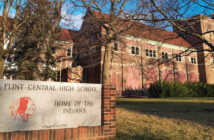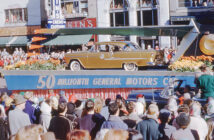From the early 1960s to the late 80s, the City of Flint rode a roller coaster of social and economic change. While the city made gains in social equality and culture, it lost ground in labor force and development. Crime began to rear its head as unemployment increased and business walked away. Population began to flee, leading to the first (of many) school closings. The explosion of growth reversed and many mayors found that a lack of taxpayer funds inhibited future investment. After 1975, it was everything a mayor could do to keep the city afloat.
This series has tracked each of Flint’s Mayors throughout history, providing a short account of their professions, lives and decisions while in office (if known). Some mayors were men/women of great deeds or of great controversy; some simply acted as placeholders in time. Each of them, however, chaired a city important to its country and its citizens on its path through triumph and heartbreak, and toward its revitalization.
For Part 1 in this series, see the 2022 January issue of My City.
George R. Poulos – (1962-64)
Born in Flint in 1926, Poulos was a resident of and dedicated to the city for his entire life. He was involved directly with city politics from 1960-74 as a city commissioner and councilman as well as mayor. He worked as an advertising sales representative for Ameritech Yellow pages for 25 years (retiring in 1987) and for a rewarding span of 30 years, he volunteered at the Bay Cliff Health Camp to work with children and adults with physical disabilities. As mayor, Poulos led the effort for the Eternal Flame at McFarlan Veterans Park. Also during his tenure, Mott Children’s Health Center and Northwestern High School were opened, and the legendary Dresden Hotel was destroyed due to fire. In the early ‘60s, civil rights issues and protests for fair housing were growing in every Michigan city, prompting Poulos to state at a mayoral meeting in Mackinaw City that the problem would have to be dealt with and that he was disappointed with the way most cities were handling it. Indeed, the issue would soon come to Flint. Poulos was a member of the National Museum of the U.S. Air Force, the American Museum in Britain, the American Legion, and the 8th Air Force Historical Society. He passed away in 2014.
Harry K. Cull – (1964-66)
Born in 1911, Cull was one of Flint’s biggest supporters and a firm believer in education first and foremost. While in office, he successfully rallied the Michigan State Board of Education for an expansion of the University of Michigan-Flint to include a freshman and sophomore class stating, “We consider this part of the total pattern of community growth … The project has the enthusiastic support of the entire community, particularly those young people who would be unable to afford a university education if they had to live away from home.” Cull also acted as city clerk for several years. During his tenure, the City Commission began efforts to relocate 3,000 families due to the impending construction of the I-69 and I-475 expressways. Outside of politics, Cull owned and operated the Harry K. Cull Insurance Agency in Flint and was a member of the Masonic Lodge. Cull passed away in 2000 at the age of 89.
Floyd J. McCree – (1966-68)
Flint could not have picked a better time for Floyd J. McCree to come to office. Housing was an issue for the decade preceding his tenure and the problem was soon brought to the forefront in Flint due to the national Civil Rights movement and the installation of the I-69 and I-475 expressways. Routed through predominantly black neighborhoods, the expressways displaced black families which, due to the practice of redlining in the city, had nearly nowhere to go. McCree spent his tenure advocating for open housing and equal employment opportunities in the city. Flint’s first African-American mayor, McCree was born in St. Louis, MO in 1923. He served in the South Pacific during World War II and rose to the rank of staff sergeant. He then came to Flint and took a job at the Buick Foundry where he became foreman and then, supervisor of maintenance. At Buick, he organized the Foundry Council with Edgar Holt to obtain equal pay and rights for Black workers. He was elected to the City Commission in 1958 and as mayor, was instrumental, along with other local activists, in the passage of the first major open housing city ordinance in the United States, threatening to resign his position if equal opportunity wasn’t given. In 1967, he stepped in to quell violence during the Detroit and Flint riots. Following his mayorship, McCree continued to serve on the City Commission until 1970. In 1971, he became the Genesee County Register of Deeds. In 1975 and 1979, he ran for Flint Mayor against James W. Rutherford, losing both times. On April 4, 2022, a bronze statue of Mayor McCree was unveiled in front of Flint City Hall.
Donald R. Cronin – (1968-70)
Born in Flint in 1929, Cronin has lived in the city all his life. He graduated from Flint Central High School in 1947, attended Mott Community College and then Central Michigan University. He acted as City Councilman from 1966-68. He was an avid soap box derby fan and as mayor, pushed for construction of a permanent racetrack in the city. He got his wish when Cronin Derby Downs opened in 1969 near the grounds of Flint Southwestern High School. The city would go on to produce multiple derby champions until the racetrack’s closure. In the beginning of 1969, after the landmark vote for open housing in Flint, Cronin presented the key to the city to Edwin C. Berry, Executive Director of the Urban League of Chicago, during his visit. Cronin stated during the presentation, “I’ve been asked what this key opens. It doesn’t have to open anything because everything in Flint is open to everyone.” He then boasted that “Flint is the most progressive city in the country.” In his acceptance speech, Berry mocked this claim causing some controversy. More controversy occurred in 1970, when Cronin along with commissioners Fred Tucker and George Sahadi Joseph, was indicted for bribery. Charges against Cronin were dropped when insufficient evidence was found to convict him of a crime. Also during his time as mayor, the Genesee Towers, the IMA Sports Arena, and Williams Elementary opened and the Urban Coalition was formed. After leaving the office, Cronin became heavily involved in the fight against drunk driving through his support of M.A.D.D. and Nu-Path. He was named the Genesee Bar Association Person of the Year in 1994 and the Michigan Bar Association Person of the Year in 1997. Cronin served as a longtime usher at St. Matthew’s Catholic Church and was a member of the Elks. He died in 2006.
Francis E. Limmer – (1970-73)
Until his appointment as mayor in 1970, Limmer worked as city clerk. He had a reputation as a bit of a wheeler-dealer, and using his skills he brokered a deal to acquire City land (including Wilson Park) and transfer all land and structures to the University of Michigan to expand the local campus. His very nature increased office oversight as evidenced when the Flint Journal challenged his policy of holding secret council meetings in addition to regular sessions. This led to the ruling that no meeting in which public business is considered and which ultimately leads to a vote or involves issues of public concern can be closed to the public – a rule still enforced today. As mayor, Limmer oversaw construction and opening of the New Northern High School and the opening of Dort Music Center (the first home of the FIM). Also during his tenure, Powers Catholic High opened its doors. In 1971, Limmer founded the Limmer Investment Corporation, the first of many side businesses that included the Michigan & Indiana Communications Corporation in 1978, G T & T Communications in 1981, and G T & T Limited Partnership in 1986. He and his partners found themselves in hot water with the S.E.C. from 1987-90 when it was shown that investors were misled through omissions of information to the tune of $3 million in unregistered promissory notes. Limmer and associates got off with nothing more than a warning.
Paul Calvin Visser – (1973-75)
The last mayor selected by the city commission, Visser graduated from Kearsley High School in 1954. He worked as a journeyman electrician until 1966, then served as assistant to congressman Donald Riegle until 1971. He became an agent for Mutual Life Insurance Company and was named “Flint Agent of the Year” 13 times. He went back to school and graduated from American College in Pennsylvania with a Master of Science in Financial Services. From 1972-73, Visser served on the Flint Civil Service Commission before being named mayor. During his tenure, Visser was perhaps the first mayor who began to make cutbacks due to lost tax revenue, economic instability and a downturn in city population. He was the first to oversee a school closure (Doyle Elementary) due to low enrollment – a trend that continues today. After his tenure, Visser continued public service on projects with the United Way, Goodwill and The Salvation Army. He acted as president of the Flint Rotary Club and was the founding chairman of the Flint Cultural Center Corporation. In 1998, Visser was named C. S. Mott Citizen of the Year. He was inducted into the Kearsley High School Hall of Fame in 2022 for his many civic and professional
James W. Rutherford – (1975-83)
In 1974, the City Charter was rewritten and mayoral elections were once again determined by public vote. (The last elected mayor was Ray A. Brownell in 1930.) The first election of the modern age pitted former police chief James W. Rutherford against former Mayor, Floyd J. McCree. Settled by a mere 205 votes, Rutherford came out on top by running a campaign focused on reduced crime and public safety. Born in Flint in 1925, Rutherford attended Flint Central High School and then served in the U. S. Navy. On his return to Flint, he joined the police department and by 1953 was promoted to detective. Rutherford attended Flint Junior College, graduating in 1958, and then Michigan State University where he obtained a degree in police administration in 1960. The next year, he assisted Flint Junior College on the implementation of their own police administration program. He was promoted to police chief in 1967 and resigned in 1975 to run for mayor. In 1977, Rutherford appointed a special task force to study mortgage redlining and found that the practice still continued in Flint unabated, leading to population decline and blight. Taxed with smaller revenue, Rutherford donated $22,000 for the purchase of a city ambulance. In 1978, to help fill the coffers, Rutherford supported an attempt to annex land from Flint, Mt. Morris and Mundy Townships (including the Genesee Valley Shopping Center). The attempt failed. After beating Floyd J. McCree in a second mayoral race in 1979, Rutherford laid off 300 employees and slowed garbage pickup in an attempt to balance the budget (and alleviate a $17 million deficit). Hoping to “save” the city, with the backing of the Mott Foundation, he announced the purchase of the I.M.A. Auditorium and its annex for the development of AutoWorld – a project that was due to cost a minimum of $38 million. In addition, the amusement park brought with it the Hyatt Regency Hotel, Water Street Pavilion and Windmill Place. Rutherford lost his bid for a third mayoral term to James Sharp by over 1,000 votes. After his tenure, Rutherford started the Rutherford Group, Inc., worked as head of public relations for Windmill Place, and as director of the Flint Downtown Development Authority in 2003. He won another brief stint as mayor in 2002 after the recall of Woodrow Stanley. Rutherford died in 2010; the Downtown parking structure at 125 W. Kearsley St. is named in his honor.
James A. Sharp Jr. – (1983-87)
The city’s first popularly elected Black mayor, Sharp was born during the Great Depression and grew up in Harlem and then The Bronx, New York. After graduating high school, he served as a Marine in the Korean War and three years in Vietnam, earning three Medals of Valor and the Vietnam Cross of Gallantry. Upon his return to the States, Sharp worked for 11 years as chief aide for Senator Don Riegle, Jr. where he learned the art of politics and governance. As Flint’s Mayor, he worked hard to lower crime rates by leaning on family values and working with city gang members. His controversial “opinion leaders” program hired 28 gang members to clean around city hall and the police department, gaining respect for gang members and getting them off the streets. He then advocated for the Board of Education to require 75 hours of community service for graduation to help students learn respect for city organizations and its population. In 1984, he opened AutoWorld and sadly, was on hand in 1986 to close it for good. In 1985, he fended off a recall attempt. In 1987, he lost the mayoral election to Matthew Collier by more than 2,000 votes. The next year, Sharp was appointed to the Oakland University Board of Trustees and acted as board chairman for Oakland University from 1992-94. In 1995, he and his wife Tessie established the James A. Sharp, Jr. and Tessie Baltrip Sharp Endowed Emergency Loan Fund for college students to use in financial emergencies to avoid interruption of their chosen career education. In 2017, Sharp received an honorary Doctor of Humanities degree from Oakland University. After retiring to Arizona, Sharp continued to advocate for the City of Flint during the recent water crisis.








